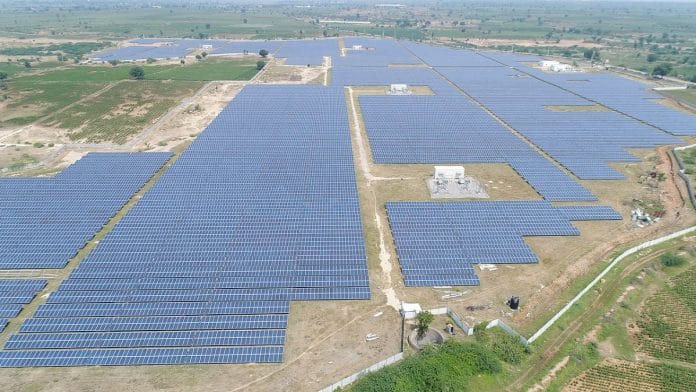New Delhi: Subsidies to renewable energy in India have doubled in the last fiscal year, reaching Rs 11,529 crore in 2021-2022, according to new data from the International Institute for Sustainable Development (IISD). This is also the first hike in allocation to the sector since 2017.
India has committed to meeting 50 per cent of its energy requirements from “non-fossil sources” by 2030, and subsidies are seen as an important tool in financing the transition away from fossil fuels towards clean energy.
“The rise in subsidies for renewables from 2021 to 2022 (fiscals ending in 2021 and 2022, respectively) was driven by a 155 per cent increase in the installation of solar photovoltaic (PV),” the IISD noted in its report titled ‘Mapping India’s Energy Policy 2022’, initially published on 31 May, with data till the 2020-21 fiscal. The report has been updated this month with data for the 2021-2022 fiscal, which ended in March this year.
Subsidies to renewable energy had dropped by 64 per cent between 2017 and 2021, from Rs 16,312 crore to Rs 5,774 crore.
Though the rising trend is encouraging, it must gain momentum to result in any meaningful transformation of India’s energy sector, said experts.
According to the report, fossil fuels (coal, fossil gas and oil) continue to be heavily subsidised in India, receiving more than four times the subsidy amount (Rs 60,316 crore) compared to renewables and electric vehicles (Rs 13,887 crore) in the 2021-22 fiscal year.
“Continued support for fossil fuels is out of step with India’s long-term objectives of energy access, energy security, and addressing climate change,” said co-author of the report, Swasti Raizada, policy advisor at IISD, in a statement.
“Aligning government support with its (India’s) climate targets will require shifting support from fossil fuels to clean energy, including developing a clear investment plan and interim targets to reach its long-term goal of net-zero (emissions) by 2070,” she added.
The transition to net-zero emissions is estimated to cost upwards of $10 trillion.
Also read: Fossil fuel subsidy 9 times higher than for clean energy, says study on India’s net-zero goal
EVs also get support
Support for renewables came from 28 central government policies, including a one-time capital infusion to the Indian Renewable Energy Development Agency (IREDA) and the Solar Energy Corporation of India (SECI) to increase their operations in the renewable sector, the report noted.
It further pointed out that subsidies to renewables fell between 2017 and 2021 because of a variety of factors such as “ending of the first tranche of subsidies under the Jawaharlal Nehru National Solar Mission (national programme), the imposition of the Goods and Services Tax (GST) on renewable energy projects in 2017, a safeguard duty on solar cells and modules from 2018, and an on-again-off-again imposition of Basic Customs Duty on PV cells and modules”.
Policy stability and post-Covid economic resurgence helped boost support in the 2021-22 fiscal, the report added.
The growing share of subsidies to renewables also comes in spite of a three per cent drop in subsidies to India’s energy sector as a whole in the 2021-22 fiscal year.
Apart from renewable energy, subsidies to the electric vehicles sector reached a record high, at Rs 2,358 crore in the 2021-22 fiscal year, a rise of 160 per cent over the 2020-21 fiscal.
Social costs of fossil fuels
Energy accounted for 19 per cent of all government revenue in the 2021-22 fiscal year, at Rs 9 lakh crore.
While a major chunk of subsidies is awarded to fossil fuels, the IISD report estimated the social costs are much higher than revenues earned — between Rs 14 lakh crore and Rs 35 lakh crore. The social costs include air pollution and the effects of climate change.
Subsidies to fossil fuels have fallen by 72 per cent since 2014, but still remain too high, the report observes.
“The long-term solution to the energy crisis lies in reducing demand for fossil fuels and increasing investment in renewable energy and other low-emissions technologies. One way to achieve this change is to shift subsidies from fossil fuels to renewables and emerging clean technologies, also known as a fossil fuel to clean energy swap,” it said.
(Edited by Nida Fatima Siddiqui)
Also read: India among 15 countries whose fossil fuel production exceeds Paris Agreement goals: UN report






